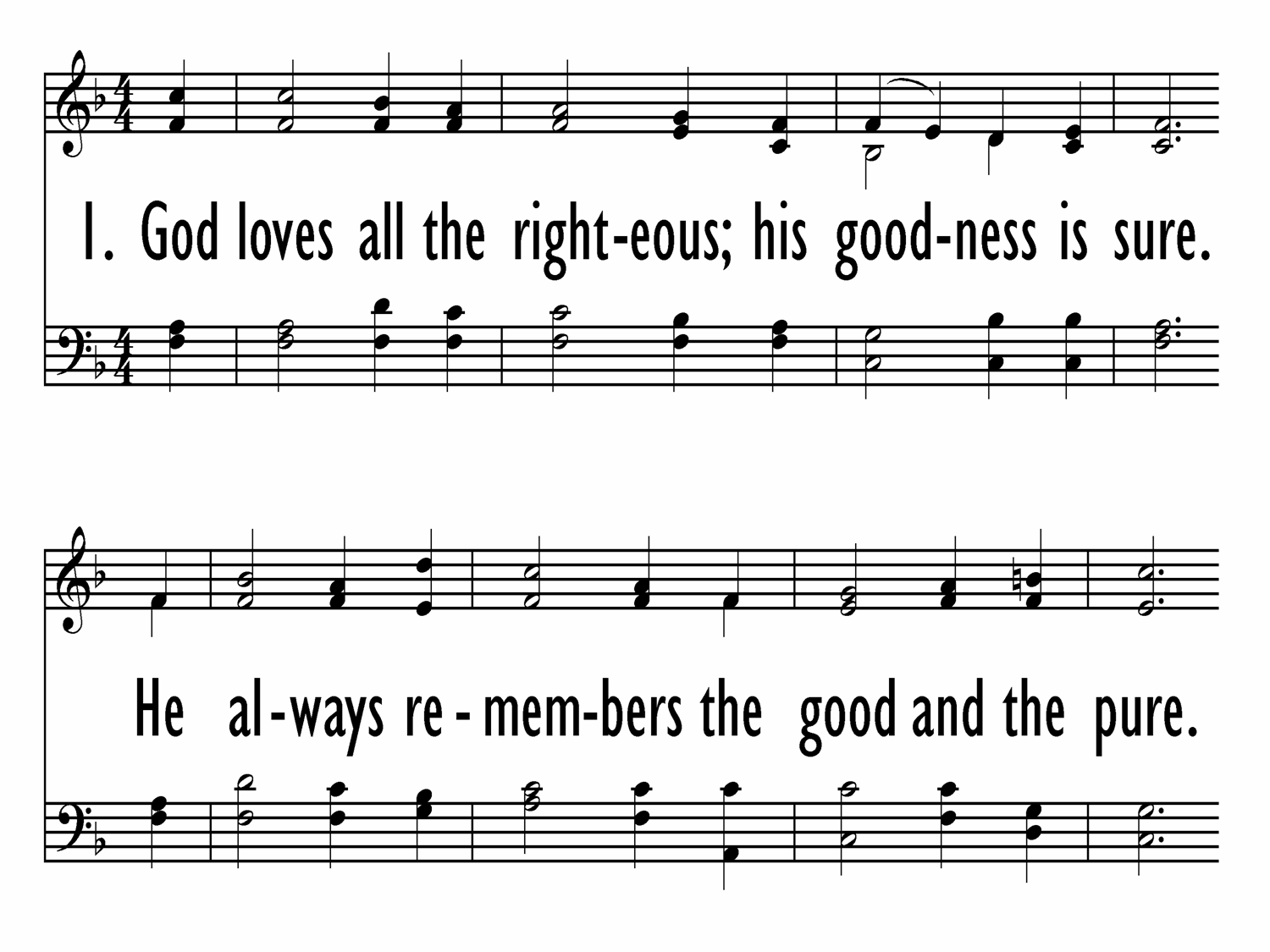- |
User Links
God Loveth the Righteous
Representative Text
1 God loves all the righteous; his goodness is sure.
He always remembers the good and the pure.
Yet once my faith faltered; I envied the proud.
In doubt and disquiet my spirit was bowed.
2 The wicked all prosper, and firm is their health;
they suffer no pangs as they gather their wealth.
They never are troubled with sickness or pain,
but boast to all others of ill-gotten gain.
3 In garments of boasting and violence decked,
with wealth more abundant than heart could expect,
they scoff at the helpless, make fun of the poor;
with curses they charge against heaven's own door.
4 They question God's knowledge and boldly defy
the might and the justice of God the Most High.
The wicked, grown wealthy, have comfort and peace,
while I, daily chastened, see troubles increase.
5 Forgetting God's children, I cried out in pain
that clean hands are worthless and pure hearts are vain.
But then in God's temple my doubts were dispelled;
the end of their journey I clearly beheld.
6 In doubt and temptation, I rest, LORD, in you;
my hand is in your hand, whatever I do.
You always are with me; you guide with your word,
and soon into glory will take me, O LORD.
7 Whom have I, O Savior, in heaven but you?
On earth for none other I long but for you.
My flesh and my heart may be weakened and sore,
but God is the strength of my heart evermore.
8 All those who forsake you will perish and die,
but, near to my Savior, most blessed am I.
I make you my refuge, my LORD and my God;
your grace and your glory I publish abroad.
Source: Psalter Hymnal (Gray) #73
Text Information
| First Line: | God loveth the righteous, His goodness is sure |
| Title: | God Loveth the Righteous |
| Meter: | 11.11.11.11 |
| Language: | English |
| Copyright: | Public Domain |
Notes
Godly wisdom concerning the destinies of the righteous and the wicked.
Scripture References:
st. 1 = vv. 1-3
st. 2 = vv. 4-6
st. 3 = vv. 6-10
st. 4 = vv. 11-14
st. 5 = vv. 13-20
st. 6 = vv. 21-24
st. 7 = vv. 25-26
st. 8 = vv. 27-28
Psalm 73, the first in Book III of the Psalms, addresses one of the most disturbing problems of the Old Testament saints: Why do the wicked often prosper while the righteous endure much suffering (see also 1, 34, 37, 49, and 112)? The psalmist confesses confidence in the LORD, but describes how his faith faltered when he considered this problem (st. 1). We too can see the wicked prosper and in good health (st. 2), even though they are proud and arrogant, "scoff at the helpless" (st. 3), and curse God Most High. Meanwhile our own troubles may increase (st. 4), and we may be tempted to become like the wicked and denounce God. Resolution comes only when we stand in God's presence–then we can discern the final outcome of wicked living (st. 5). God will never fail to sustain us throughout our lives and afterward will take us to glory (st. 6). With that assurance, we confess our dependence on God alone and our conviction that God will sustain us forever (st. 7). The psalm concludes with renewed commitment to trust in God and a promise to make God's grace known to others (st. 8). The versification (somewhat altered) is from the 1912 Psalter. Another setting of Psalm 73 is at 554.
Liturgical Use:
Whenever "the fear of the LORD is the beginning of wisdom" is proclaimed; especially appropriate when Christians suffer and the wicked prosper and grow defiant in their prosperity.
--Psalter Hymnal Handbook
Tune
HIDING IN THEE (Sankey)Ira David Sankey (b. Edinburgh, PA, 1840; d. Brooklyn, NY, 1908) composed HIDING IN THEE (also known as SANKEY) and first published it in Welcome Tidings (1887), compiled by Lowry, Doane (PHH 473), and Sankey. It was set to the text "O Safe to the Rock That Is Higher than I." The four lines of HIDIN…
[Encamped along the hills of light]
OSCEOLA


 My Starred Hymns
My Starred Hymns







